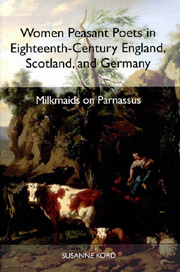Book contents
- Frontmatter
- Contents
- List of Illustrations
- Acknowledgments
- Introduction: Aesthetic Evasions and Social Consequences
- 1 Back to Nature: Bourgeois Aesthetic Theory and Lower-Class Poetic Practice
- 2 The Wild and the Civilized: Poet Making
- 3 The Life As the Work: Counterfeit Confessions, Bogus Biographies, Literary Lives
- 4 A Literature of Labor: Poetic Images of Country Life
- 5 Inspired by Nature, Inspired by Love: Two Poets on Poetic Inspiration
- 6 Of Patrons and Critics: Reading the Bourgeois Reader
- Conclusion: On the Gender and Class of Art
- Appendix: Short Biographies of Women Peasant Poets
- Works Cited
- Index
Appendix: Short Biographies of Women Peasant Poets
Published online by Cambridge University Press: 05 February 2013
- Frontmatter
- Contents
- List of Illustrations
- Acknowledgments
- Introduction: Aesthetic Evasions and Social Consequences
- 1 Back to Nature: Bourgeois Aesthetic Theory and Lower-Class Poetic Practice
- 2 The Wild and the Civilized: Poet Making
- 3 The Life As the Work: Counterfeit Confessions, Bogus Biographies, Literary Lives
- 4 A Literature of Labor: Poetic Images of Country Life
- 5 Inspired by Nature, Inspired by Love: Two Poets on Poetic Inspiration
- 6 Of Patrons and Critics: Reading the Bourgeois Reader
- Conclusion: On the Gender and Class of Art
- Appendix: Short Biographies of Women Peasant Poets
- Works Cited
- Index
Summary
Bentley, Elizabeth (1767–1839; England: Norwich), poet and schoolmistress. Daughter of journeyman cordwainer/shoemaker Daniel (some sources: Christopher) Bentley and Mary Lawrence, an only child. She received no formal education and was taught to read and write by her father. She read as much as she could during her childhood. In circa 1777, her father was paralyzed by a stroke; he died of a second stroke in 1783. Bentley began to write circa 1785; her mother showed her first verses to her circle of acquaintances. Aware of the shortcomings of her education, Bentley deliberately set out to improve her writing with the help of grammar books. Early literary influences included Oliver Goldsmith, Alexander Pope, Thomas Gray, William Shakespeare, and John Milton. Her works, many of which first appeared in the Norwich Chronicle, include many pastorals and nature poems, an ode supporting the abolition of the slave trade and a poem on cruelty to animals. Her first volume was read by nearly 2,000 subscribers and was positively reviewed in the Gentleman's Magazine and in the Monthly Review. From the proceeds of the volume, Bentley opened a small school to support herself and her mother. She received support from the Royal Literary Fund twice, in 1799 and in 1829.
Works by Elizabeth Bentley: Genuine Poetical Compositions (1791); “An Ode on the Glorious Victory” (1805); Poems (1821); Miscellaneous Poems (1835). One of her poems is anthologized in Feldman, 89–90.
- Type
- Chapter
- Information
- Women Peasant Poets in Eighteenth-Century England, Scotland, and GermanyMilkmaids on Parnassus, pp. 259 - 272Publisher: Boydell & BrewerPrint publication year: 2003



